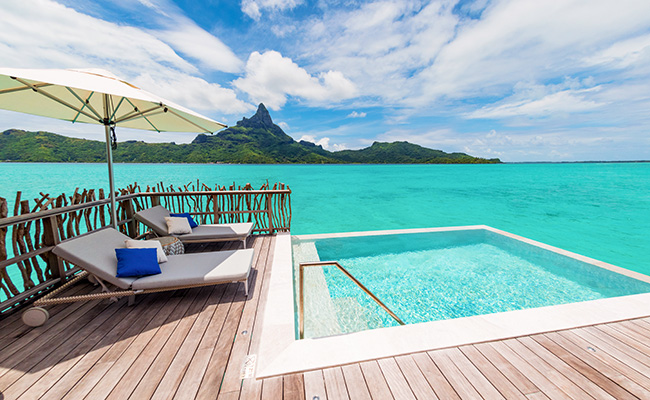A Marine Biologist's Perspective: Sustainable Luxury and Coral Reef Conservation at The Brando

As a marine biologist focused on coral reef health, I've seen firsthand the devastating effects of climate change and unsustainable practices on these vital ecosystems. When I heard about The Brando, a luxury resort in French Polynesia committed to sustainability, I was intrigued. When the opportunity arose to conduct research at the Tetiaroa Society research station located on the atoll, I jumped at the chance. After two weeks immersed in this unique environment, I can confidently say that The Brando is not just a beautiful escape, but a beacon of hope for responsible tourism and marine conservation.
My first impression upon arriving was simply breathtaking. The turquoise water gently lapping against the pristine white sand, the dense, vibrant green vegetation, and the modern, Polynesian-inspired architecture created a sense of harmony and tranquility. The warm, golden glow of the late afternoon sun filtered through the palm trees, painting dappled shadows on the beach – it was truly paradise. But beyond the surface beauty, I was eager to explore the resort's commitment to environmental stewardship.
The Brando resort seamlessly blends with the natural beauty of Tetiaroa, reflecting a commitment to environmental preservation.
The Brando's Revolutionary Sea Water Air Conditioning (SWAC) System
One of the most impressive aspects of The Brando is its innovative Sea Water Air Conditioning (SWAC) system. In a world grappling with the effects of traditional air conditioning on the environment, this system offers a remarkable alternative. It works by drawing cold water from the deep ocean – depths where the sun's warmth doesn't penetrate – and using it to cool the resort. This process significantly reduces energy consumption, minimizing the resort's carbon footprint.
The numbers speak for themselves. The Brando reports an impressive 90% reduction in energy consumption for cooling compared to conventional air conditioning systems. This translates to a substantial decrease in greenhouse gas emissions, making a real difference in the fight against climate change.
But what about the impact on the surrounding marine environment? As a marine biologist, this was a critical question for me. I focused my observations on the coral reefs near the SWAC outflow, specifically studying species like Acropora and Porites. My findings were encouraging. Compared to other areas, the coral reefs near the outflow appeared healthier, exhibiting less bleaching and more vibrant growth. This suggests that the SWAC system, when properly managed, can minimize its impact on sensitive ecosystems and potentially even create favorable conditions for coral growth.

The SWAC intake pipes are strategically placed to minimize disturbance to marine life, illustrating The Brando's commitment to responsible innovation.
Research at the Tetiaroa Society Research Station
The Tetiaroa Society research station provided an invaluable platform for my research. Equipped with state-of-the-art facilities, it allowed me to delve deep into the intricacies of the atoll's marine ecosystem. During my two-week stay, I focused on monitoring coral bleaching, a phenomenon driven by rising ocean temperatures.
One specific project involved tagging reef sharks. We carefully captured and tagged several sharks with acoustic transmitters, allowing us to track their movements and understand their habitat use within the atoll. This data is crucial for developing effective conservation strategies. Preliminary findings suggest that these sharks play a vital role in maintaining the health of the reef ecosystem.
 Image Placeholder: Add a relevant picture here
Image Placeholder: Add a relevant picture here
Scientists at the Tetiaroa Society research station are dedicated to understanding and protecting the unique biodiversity of the atoll.
I spent hours examining coral samples under a microscope, meticulously documenting signs of stress and recovery. The vibrant marine life I encountered while diving and snorkeling was awe-inspiring - a constant reminder of what's at stake. The conversations I had with the resort's staff were equally inspiring. They were genuinely passionate about sustainability and eager to share their knowledge. Their dedication reinforced my sense of hope for the future of coral reefs.
A Call to Action: Protecting Our Coral Reefs
My experience at The Brando and the Tetiaroa Society research station has solidified my belief that sustainable tourism can play a significant role in protecting marine ecosystems. It is not merely about minimizing negative impacts; it is about actively contributing to conservation efforts.
Here are some specific actions you can take to support marine conservation:
- Reduce your carbon footprint: Choose sustainable transportation options, reduce your energy consumption, and support businesses committed to reducing emissions.
- Avoid single-use plastics: Plastics are a major threat to marine life. Reduce your reliance on single-use plastics by bringing your own reusable bags, water bottles, and containers.
- Choose eco-friendly resorts: Support resorts like The Brando that prioritize sustainability and invest in conservation efforts. Seek out certifications like LEED or Green Globe.
- Support marine conservation organizations: Donate to or volunteer with organizations like the Coral Reef Alliance (coral.org), which are working to protect coral reefs around the world.
- Educate yourself and others: Learn more about the threats facing coral reefs and share your knowledge with friends, family, and colleagues.
 Image Placeholder: Add a relevant picture here
Image Placeholder: Add a relevant picture here
Healthy coral reefs are vital for marine biodiversity and provide essential ecosystem services. Supporting sustainable tourism helps protect these precious environments.
The future of our coral reefs depends on our collective actions. By making conscious choices and supporting sustainable initiatives, we can help ensure that these vibrant ecosystems thrive for generations to come. The Brando serves as a powerful example of how luxury and sustainability can coexist, creating a positive impact on both the environment and the local community. Let us all strive to be responsible travelers and stewards of our planet's precious marine resources.